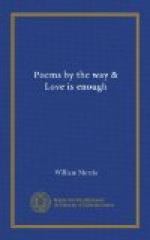KING PHARAMOND
Troop past in the twilight, O pageant that served
me,
Pour through the dark archway to the light that awaits
you
In the chamber of daïs where I once sat among you!
Like the shadows ye are to the shadowless glory
Of the banquet-hall blazing with gold and light go
ye:
There blink for a little at your king in his bravery,
Then bear forth your faith to the blackness of night-tide,
And fall asleep fearless of memories of Pharamond,
And in dim dreams dream haply that ye too are kings
—For your dull morrow cometh that is as
to-day is.
Pass on in contentment, O king, I discerned not
Through the cloak of your blindness that saw nought
beside thee,
That feared for no pain and craved for no pleasure!
Pass on, dead-alive, to thy place! thou art worthy:
Nor shalt thou grow wearier than well-worshipped idol
That the incense winds round in the land of the heathen,
While the early and latter rains fall as God listeth,
And on earth that God loveth the sun riseth daily.
—Well art thou: for wert thou the
crown of all rulers,
No field shouldst thou ripen, free no frost-bounden
river,
Loose no heart from its love, turn no soul to salvation,
Thrust no tempest aside, stay no plague in mid ocean,
Yet grow unto thinking that thou wert God’s
brother,
Till loveless death gripped thee unloved, unlamented.
—Pass forth, weary King, bear thy crown
high to-night!
Then fall asleep, fearing no cry from times bygone,
But in dim dreams dream haply that thou art desired,—
—For thy dull morrow cometh, and is as
to-day is.
Ah, hold! now there flashes a link in the archway,
And its light falleth full on thy face, O Honorius,
And I know thee the land’s lord, and far away
fadeth
My old life of a king at the sight, O thou stranger!
For I know thee full surely the foe the heart hateth
For that barren fulfilment of all that it lacketh.
I may turn away praising that those days long departed
Departed without thee—how long had I piped
then
Or e’er thou hadst danced, how long were my
weeping
Ere thou hadst lamented!—What dear thing
desired
Would thy heart e’er have come to know why I
craved for!
To what crime I could think of couldst thou be consenting?
Yet thou—well I know thee most meet for
a ruler—
—Thou lovest not mercy, yet shalt thou
be merciful;
Thou joy’st not in justice, yet just shall thy
dooms be;
No deep hell thou dreadest, nor dream’st of
high heaven;
No gleam of love leads thee: no gift men may
give thee;
For no kiss, for no comfort the lone way thou wearest,
A blind will without life, lest thou faint ere the
end come.
—Yea, folly it was when I called thee my
foeman;
From thee may I turn now with sword in the scabbard
Without shame or misgiving, because God hath made
thee




